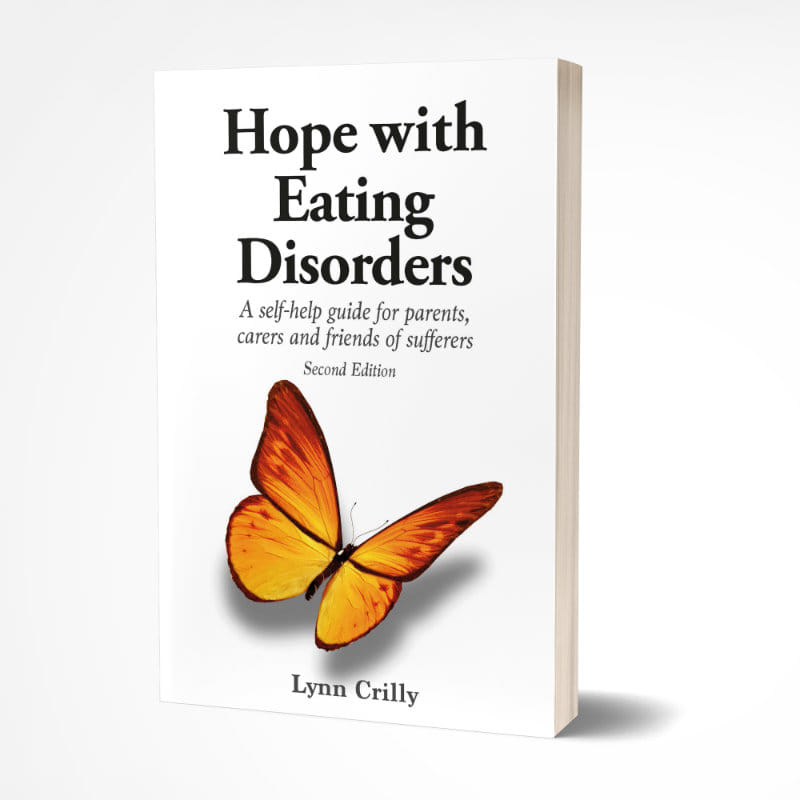*this post is a book review post, I am privileged to be sharing about the second edition of this book. I will be talking about eating disorders including my own story, so please take this as a trigger warning*
My name is Karen and at the age of about 19, I was bulimic. My mother died in 1994, and I comfort ate for a year to deal with the emotional baggage that her death left me processing. I gained a lot of weight. I then did a weight loss program, and lost a lot of weight. During this process I realised that I could use laxatives to purge my body of food, and that I could, in theory eat as much as I liked, and not gain weight. I put my body through three years of hell, binge eating, and punishing it with masses of laxatives that I bought easily from local supermarkets and pharmacies. I was very unwell, but not thin enough that people could twig that I was actually struggling with an eating disorder. It was only when I landed in A&E one night with a racing pulse and heart rate that was abnormally high, having passed out at a friend’s house, that it came to light. I was very fortunate not to end up with serious health issues as a result of what I did to my body. I had a lot of help, counselling and therapy, and now have a far healthier relationship with food and my body. Not perfect, but what would be defined as normal.
So when I was asked to review Hope With Eating Disorders by Lynn Crilly, I was prepared to face a bit of my past, but also keen to see what might be helpful, for me, as a mother, with two children. You see, I am brutally aware that self image, parental influence, social media, and how people view and talk about food and our bodies can impact them. My daughter is hitting puberty and is aware of her body, it’s shape, it’s size and it’s changes and what she and her peers are going through. She is also fashion conscious, and wants to look like the images she sees in the media and like her trendy friends. My son wants to enter the world of ballet, which still can be very tough in terms of the quest for perfection, size and shape, and body image. I want to protect them, nurture them and most of all be aware of how to make sure that they don’t struggle like I did. I think having a tool like this book is something all parents who have experienced an eating disorder themselves should have to arm themselves as they navigate parenting.

About the book:
Since the first edition of Hope with Eating Disorders was published in 2012, eating disorders have become more widely recognised and treatments have progressed, as have attitudes to this most dangerous of mental health problems.
In this second edition, which maintains Lynn Crilly’s warm, non-judgemental, family-friendly approach, the more recently recognised eating disorders have been included, the range of treatment options – both mainstream and alternative – has been fully reviewed and revised, and the impact of social and technological change has been fully accommodated, with the role of social media for good and ill to the fore. New case histories highlight key issues, and throughout all references to research and stats have been reviewed and updated. Men’s eatingdisorders are now addressed by contributing author Dr Russell Delderfield.
Since originally writing Hope with Eating Disorders, Lynn has experienced seven years of counselling practice and seven years of her own daughter’s recovery from an eating disorder and obsessive compulsive disorder, underpinning her realistic insight into what recovery actually is and means. Hope with Eating Disorders is a practical, supportive guide for anyone helping someone with an eating disorder be they a family member, teacher, sports coach, workplace colleague or friend.
Lynn is not just another expert sharing medical and counselling knowledge. She has been in the brutal reality of watching a child struggle with their mental health and eating disorders and whilst the book is written in a “clinical” way (it’s not a self help, easy read book) it is an excellent guide for parents or people dealing with a loved one struggling with eating issues.
It covers diagnosis, treatment options, resources, myths and truths, how social media has impacted both for good and bad, current statistics, and research, current and newly recognised eating disorders and also lots of information for those trying to process what their loved ones are going through.
I cannot recommend this book more highly. I will admit to crying my way through a chapter or two, as some of what I went through came back to me, and remembering my own treatment process, and how my father and close friends felt walking me through my bulimia. I wish this book had been available for them.
I would say that if you are on a journey with eating disorders with a child, a family member or close friend then this book will be very helpful. I think as someone recovered from an eating disorder this book is also really useful. It has helped me to think about my relationship with food and also an insight into how I relate to food around my children in a way that is healthier than some examples I witnessed in my childhood.
It’s not often I read a book that’s non fiction and immediately want to recommend it, this book is one of those.
*If you are struggling with an eating disorder or think someone you love may be, there is help out there, please don’t hide. Seek help*
This post is written for Eating Disorder Week, sharing our voices to be heard, as those of us who are recovered support those still fighting the battle.